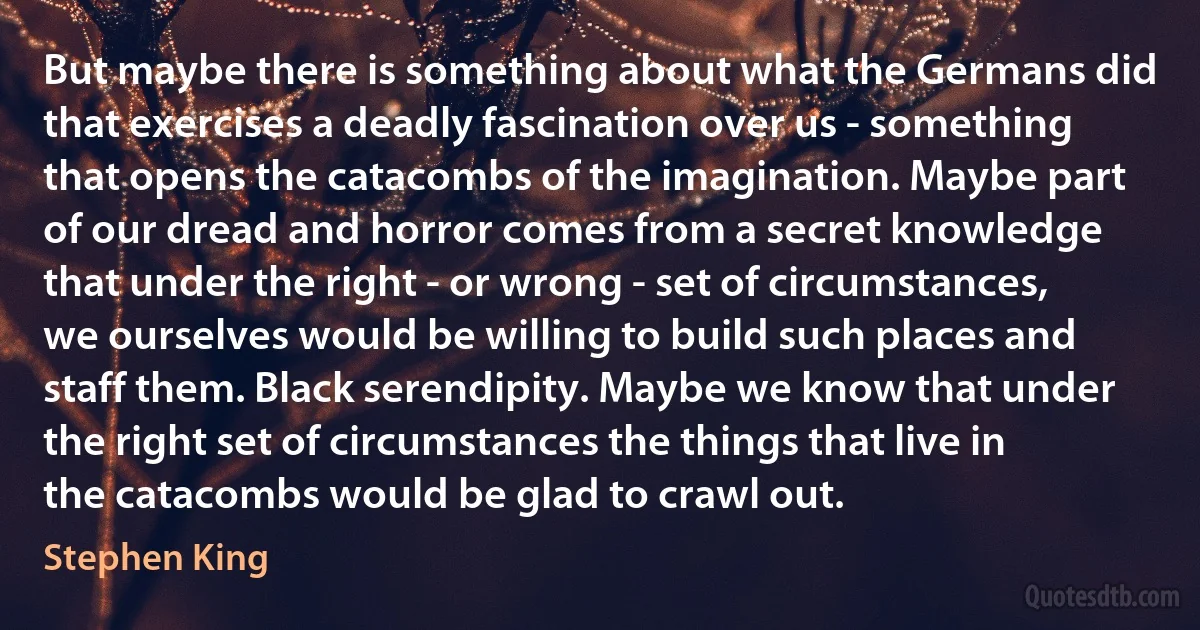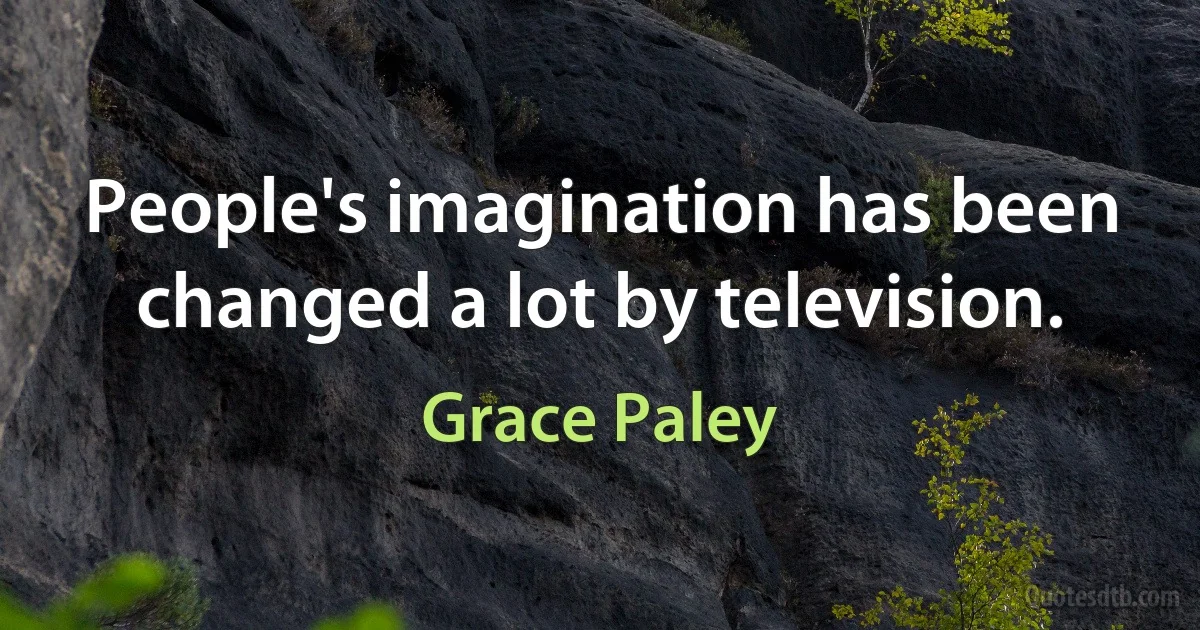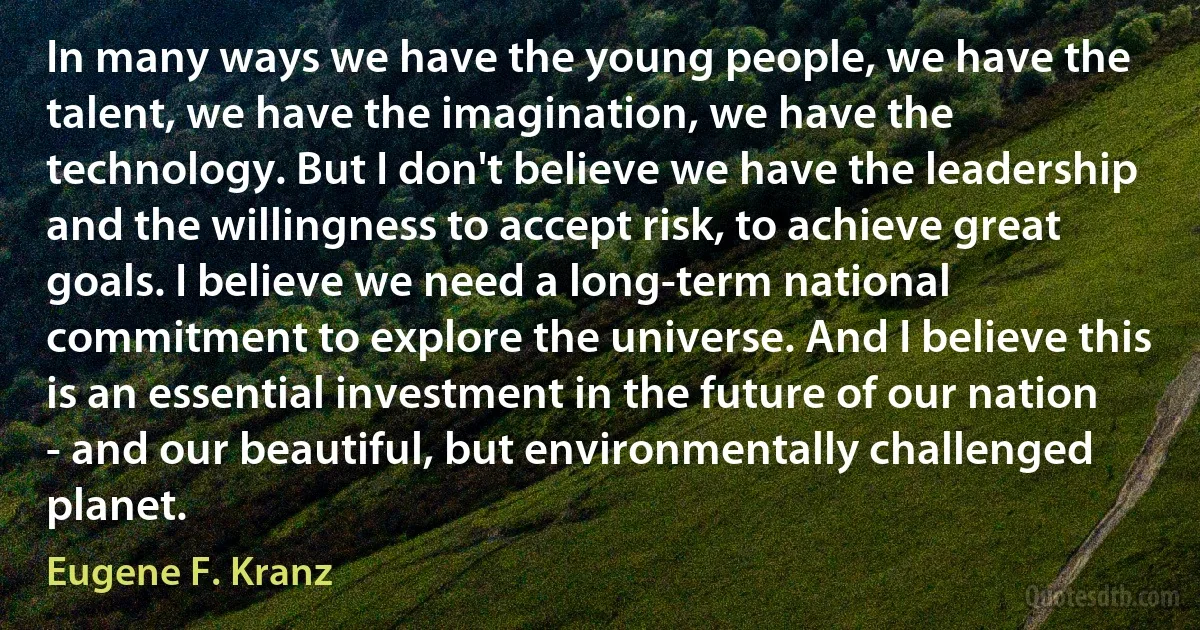Imagination Quotes - page 96
There are some secret springs in the affections which, when they are set a-going by some object in view, or, though not in view, yet rendered present to the mind by the power of imagination, that motion carries out the soul, by its impetuosity, to such violent, eager embracings of the object, that the absence of it is insupportable.

Daniel Defoe
It is not particularly satisfactory to see equations set forth as direct results of observation and experiment, where we used to get long mathematical deductions as apparent proofs of them. Nevertheless, I believe that we cannot, without deceiving ourselves, extract much more from known facts than is asserted in the papers referred to. If we wish to lend more color to the theory, there is nothing to prevent us from supplementing all this and aiding our powers of imagination by concrete representations of the various conceptions as to the nature of electric polarisation, the electric current, etc.

Heinrich Hertz
Whereas the personal unconscious consists for the most part of "complexes", the content of the collective unconscious is made up essentially of "archetypes". The concept of the archetype, which is an indispensable correlate of the idea of the collective unconscious, indicates the existence of definite forms in the psyche which seem to be present always and everywhere. Mythological research calls them 'motifs'; in the psychology of primitives they correspond to Levy-Bruhl's concept of "representations collectives," and in the field of comparative religion they have been defined by Hubert and Mauss as 'categories of the imagination'... My thesis, then, is as follows: In addition to our immediate consciousness, which is of a thoroughly personal nature and which we believe to be the only empirical psyche (even if we tack on the personal unconscious as an appendix), there exists a second psychic system of a collective, universal, and impersonal nature which is identical in all individuals.

Carl Jung
It struck me as I waited that all great enterprises are about logistics. Not genius or inspiration or flights of imagination, skill or cunning, but logistics. Building pyramids or landing spacecraft on Jupiter or invading whole continents or painting divine scenes over the roofs of chapels: logistics.

Tom McCarthy (writer)
There is a fifth dimension beyond that which is known to man. It is a dimension as vast as space and as timeless as infinity. It is the middle ground between light and shadow, between science and superstition, and it lies between the pit of man's fears and the summit of his knowledge. This is the dimension of imagination. It is an area which we call the Twilight Zone.

Rod Serling
...she recreated the mountains not as she had originally seen them but as she eventually chose to perceive them, not only a capacity to observe the world but a capacity to alter his or her observation of it - which, in the end, is the capacity to alter the world, itself. Those people who recognise that imagination is reality's master, we call "sages," and those who act upon it, we call "artists."

Tom Robbins
The common people remember and tell of what they are able to grasp and what they are able to transform into legend. Anything else passes them by without deeper trace, with the dumb indifference of nameless natural phenomena, which do not touch the imagination or remain in the memory. This hard and long building process was for them a foreign task undertaken at another's expense. Only when, as the fruit of this effort, the great bridge arose, men began to remember details and to embroider the creation of a real, skilfully built and lasting bridge with fabulous tales which they well knew how to weave and to remember.

Ivo Andrić
I have said that nothing factual that I write or say will be as truthful as my fiction. The life, the opinions, are not the work, for it is in the tension between standing apart and being involved that the imagination transforms both. Let me give some minimal account of myself. I am what I suppose would be called a natural writer. I did not make any decision to become one. I did not, at the beginning, expect to earn a living by being read. I wrote as a child out of the joy of apprehending life through my senses - the look and scent and feel of things; and soon out of the emotions that puzzled me or raged within me and which took form, found some enlightenment, solace and delight, shaped in the written word.

Nadine Gordimer
Dante has not deigned to take his inspiration from any other. He has wished to be himself, himself alone; in a word, to create. He has occupied a vast space, and has filled it with the superiority of a sublime mind. He is diverse, strong, and gracious. He has imagination, warmth, and enthusiasm. He makes his reader tremble, shed tears, feel the thrill of honor in a way that is the height of art. Severe and menacing, he has terrible imprecations for crime, scourgings for vice, sorrow for misfortune. As a citizen, affected by the laws of the republic, he thunders against its oppressors, but he is always ready to excuse his native city, Florence is ever to him his sweet, beloved country, dear to his heart. I am envious for my dear France, that she has never produced a rival to Dante; that this Colossus has not had his equal among us. No, there is no reputation which can be compared to his.

Napoleon Bonaparte
I do believe that inside each of us, inside our imaginative lives, dwells every possibility in the human journey. It is a matter of access, I suppose. And the courage to access. I think we all have the same weapons: patience, imagination, hope, and the ability to be crucified and yet resurrect. I strive to be open to all of these.

Shobha Rao
My whole ambition in the pictorial domain is to materialise the images of concrete irrationality with the most imperialist fury of precision. - In order that the world of the imagination and of concrete irrationality may be as objectively evident.. ..as that of the exterior world of phenomenal reality. - The important thing is what one wishes to communicate: the concrete irrational subject. - The means of pictorial expression are placed at the service of this subject.

Salvador Dalí
Glory is largely a theatrical concept. There is no striving for glory without a vivid awareness of an audience-the knowledge that our mighty deeds will come to the ears of our contemporaries or "of those that are to be." We are ready to sacrifice our true, transitory self for the imaginary eternal self we are building up, by our heroic deeds, in the opinion and imagination of others.

Eric Hoffer
Look. I'd be the first to admit that I don't have an ounce of common sense, but I think people should be fucking in the streets. Assfucking. Especially women fucking men in the ass with dildos. What this country needs is a lot more sodomy. Because there are a lot of crises a-coming: global warming as we rape Alaska for oil, the return of coathanger abortions, downward economic spirals, nuclear terrorism, the reemergence of "Burn the motherfucker down," "Fuck the police," "Blow it all up and let's start all over again"-it will be a dark and frightening time. And our retarded president will offer little solace or hope. If you think things cannot get any worse, you have no imagination and no sense of history.

John S. Hall
The grand discoveries which scientific experiment yielded at and about the turn of the century, in which investigators in many countries took an eminent part and which were destined all unexpectedly to give us a fresh insight into the structure of atoms, were due in the first instance, as all are aware, to the work of the great investigators of the English school, Sir Joseph Thomson and Sir Ernest Rutherford, who have inscribed their names on the tablets of the history of scientific research as distinguished witnesses to the truth that imagination and acumen are capable of penetrating the crowded mass of registered experience and of revealing Nature's simplicity to our gaze.

Niels Bohr
Art on the other hand speaks to us of resignation and rejoicing in reality, and does so through a transformation of our experience of the world into an order wherein all facts become joyous; the more terrible the material the greater the artistic triumph. This has nothing at all to do with "a constant awareness of the problems of our time" or any other vague public concern. It is a transformation that is mysterious, personal and ethical. And the moral effect of art is only interesting when considered in the particular. For it is always the reality of the particular that provides the occasion and the spring of art - it is always "those particular trees/ that caught you in their mysteries" or the experience of some loved object. Not that the matter rests here. It is the transcendent imagination working on this material that releases the mysterious energies which move and speak of deepest existence.

Patrick Swift
The country needs and, unless I mistake its temper, the country demands bold, persistent experimentation. It is common sense to take a method and try it: If it fails, admit it frankly and try another. But above all, try something. The millions who are in want will not stand by silently forever while the things to satisfy their needs are within easy reach. We need enthusiasm, imagination and the ability to face facts, even unpleasant ones, bravely. We need to correct, by drastic means if necessary, the faults in our economic system from which we now suffer. We need the courage of the young. Yours is not the task of making your way in the world, but the task of remaking the world which you will find before you. May every one of us be granted the courage, the faith and the vision to give the best that is in us to that remaking!

Franklin D. Roosevelt
Literature must be written from the periphery toward the center, and we can criticize the center. Our credo, our theme, or our imagination is that of the peripheral human being. The man who is in the center does not have anything to write. From the periphery, we can write the story of the human being and this story can express the humanity of the center, so when I say the word periphery, this is a most important creed of mine.

Kenzaburō Ōe
The Pilgrim's Progress is composed in the lowest style of English, without slang or false grammar. If you were to polish it, you would at once destroy the reality of the vision. For works of imagination should be written in very plain language; the more purely imaginative they are the more necessary it is to be plain.

Samuel Taylor Coleridge



